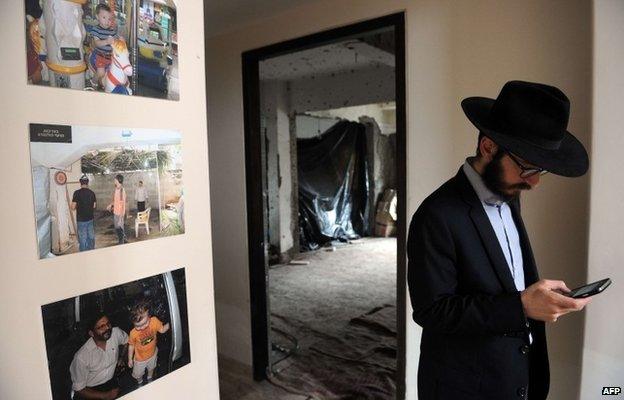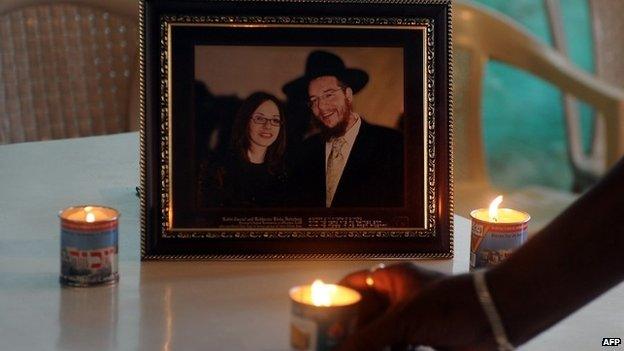Mumbai Jewish centre reopens six years after attack
- Published

Rabbis from across Asia gathered on Tuesday at the newly renovated centre
A Jewish centre in the Indian city of Mumbai has reopened, nearly six years after it was stormed by gunmen who attacked the city.
Six Jews were killed at the centre, which was one of several places targeted in the November 2008 attacks.
Indian forces regained control of the building after several days and killed two gunmen there.
The attacks at a railway station, two hotels and other landmarks claimed 166 lives. Nine gunmen were also killed.
Rabbi Gavriel Holtzberg, 29, and his pregnant wife Rivkah, 28, who ran the Chabad House Jewish cultural centre, were killed in the attack, but the couple's two-year-old son, Moshe, survived.
He was found crying next to their bodies by his Indian nanny, who hid in a cupboard during the attack, but emerged to rescue the child after his parents were killed.
She later escorted the boy to Israel to care for him. He has extended family there.
'Message for the whole world'
Some 25 rabbis from across Asia gathered on Tuesday at the newly renovated centre and announced plans to turn the top two floors of the five-storey building into a $2.5m (£1.5m) museum.
The refurbished cultural centre has a synagogue, offices, guest rooms, a restaurant, a commercial kitchen and security rooms.
"We're not moving into a new building - we are returning to our original building and we will be continuing and expanding all the activities that took place here," Rabbi Israel Kozlovsky, new co-director of the centre with his wife, Chaya, told the AFP news agency.
Chintan Sakariya, a local businessman, who witnessed the attack on the centre, said he had "mixed" feelings over its reopening.
"They're coming back strongly and we support that. But there's going to be a lot of inconvenience for local residents, a lot of security, a lot of blockades," he said.

Rabbi Gavriel Holtzberg and his wife Rivkah who ran the centre were killed in the attack
Rabbi Moshe Kotlarsky, a prominent member of the orthodox Chabad-Lubavitch movement who helped to rebuild the centre, said its reopening would be "really a message for the whole world".
"You can overcome challenges, even the most horrific of challenges. You can and must rebuild, and this project serves as a beacon of light and hope that evil will not prevail," he said in a statement.
In 2012, India executed Mohammad Ajmal Amir Qasab, the sole surviving gunman from the 2008 attacks.
Qasab was part of a heavily armed and well-drilled, 10-member militant unit which arrived in Mumbai by sea on 26 November 2008.
The men split into groups to attack various targets. Their assault on the Taj Mahal Hotel, Oberoi Trident Hotel and the Jewish centre went on for more than two days.
Pakistan-based banned militant group Lashkar-e-Taiba was blamed for the attacks, which soured India-Pakistan ties.